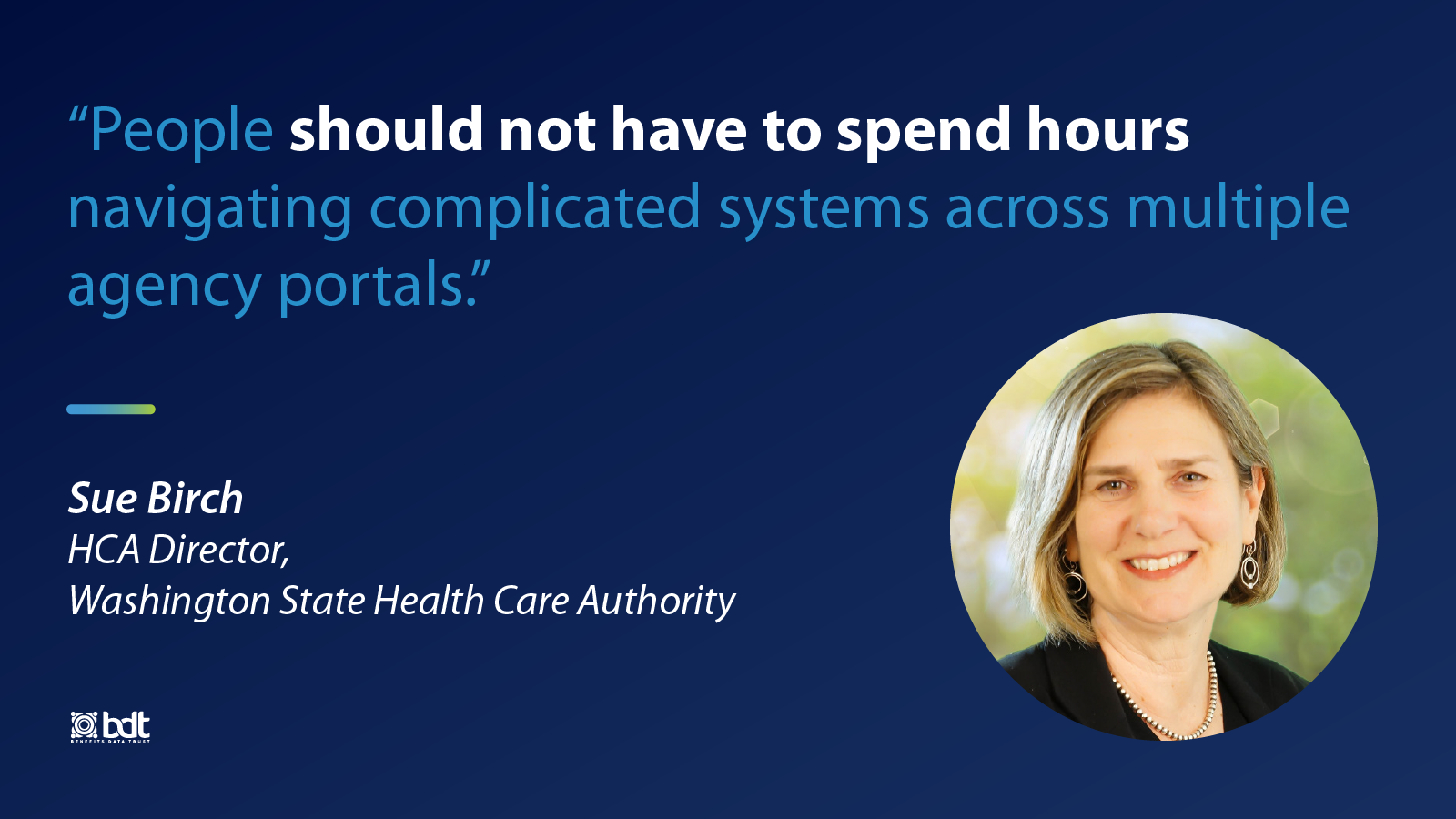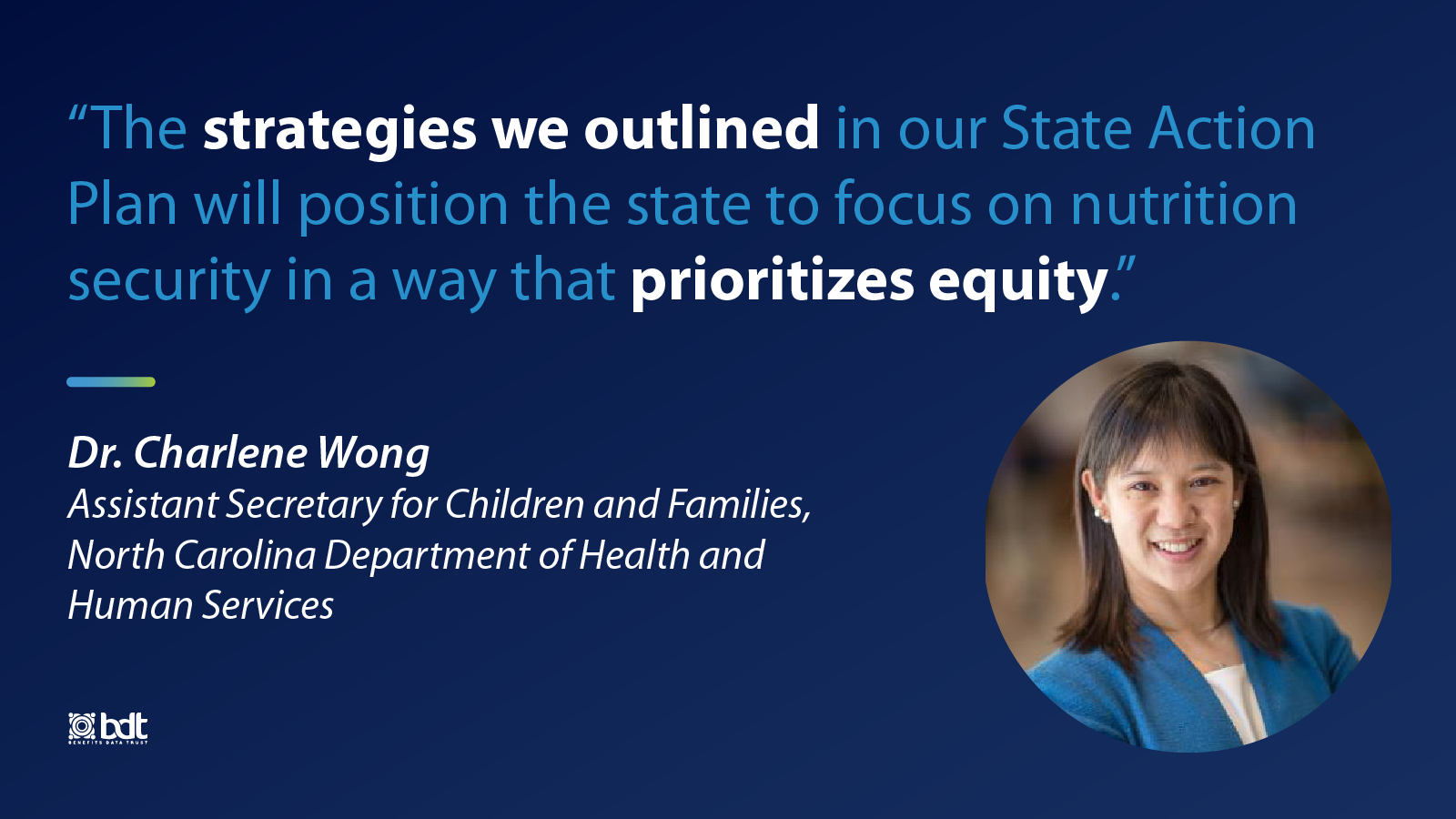For millions of families, putting food on the table is a daily challenge, as is accessing assistance to live healthier, more financially secure lives. To better serve people, systems need to change. That is why Benefits Data Trust (BDT) is working with North Carolina and the state of Washington to pursue comprehensive improvements to their benefits systems through ambitious goals to increase program participation and simplify access.
The agencies leading this work in North Carolina and Washington recently released detailed action plans to create systems that provide dignified, efficient, and proactive assistance. To learn more about their efforts, we invite you to read our Q&A with Charlene Wong, MD MSHP, Assistant Secretary for Children and Families at the North Carolina Department of Health and Human Services, and Susan E. Birch, MBA, BSN, RN, Director of the Washington State Health Care Authority.
-
Why is it critical to improve the benefits system in your state?

Susan Birch (WA): We know health is much broader than just medical services. Factors like food security, transportation, employment, and housing are essential to achieving better health outcomes. Our State Action Plan helps fulfill the state’s goal of equitable, person-focused care and connects Washingtonians directly to the services they need.
Our state is a leader in health transformation and is investing heavily in client-centeredness. People should not have to spend hours navigating complicated systems across multiple agency portals. The goal is to provide clients with the most complete care possible, to connect them to services and ensure they maintain access to those services.
We also envision a future where these enhanced technologies are more mobile friendly and available in languages other than English. These capabilities should give more people, including historically marginalized communities and those in rural areas, comprehensive access to more services, which broadens the state’s focus on health care through an equity lens.
Dr. Charlene Wong (NC): North Carolina Department of Health and Human Services (NCDHHS) is committed to supporting whole-person health and well-being. Our state made huge efforts to increase access and availability of nutrition programs during the COVID-19 pandemic, which prevented significant spikes in the food insecurity rate.
We simultaneously recognized the disproportionate impact of the pandemic on communities of color and people who experience persistent poverty or who are from historically marginalized communities. The strategies we outlined in our State Action Plan will position the state to focus on nutrition security in a way that prioritizes equity.
NCDHHS is in a unique position to move the needle on nutrition security since we house many of the state’s largest nutrition programs, like WIC and SNAP, and have taken bold steps to address hunger and promote nutrition security through our Medicaid program. We were eager for BDT’s partnership, as we knew that many North Carolina families needed more support as quickly as possible. The expert team and resources BDT brought to North Carolina have been instrumental both in fully developing the NCDHHS State Action Plan and supporting implementation of the innovative initiatives included in the Plan.
-
What are the overarching goals of your new State Action Plan?
Susan Birch (WA): The Washington State Action Plan for Removing Barriers to Health and Human Services has two primary goals:
- Remove barriers to accessing benefits. We envision a future where clients can seamlessly apply for multiple programs in less than 20 minutes and immediately know their eligibility status for Washington’s Medicaid (Apple Health), Supplemental Nutrition Assistance Program (SNAP), Temporary Assistance for Needy Families (TANF) and Working Connections Child Care programs.
- Share information across organizational boundaries. We aim to establish a comprehensive view of clients so we can proactively offer benefits that they qualify to receive.
Dr. Charlene Wong (NC): Today, nearly 11% of North Carolinians don’t know where their next meal will come from. Our primary goal within the NCDHHS State Action Plan for Nutrition Security is to reduce the number of North Carolinians who experience hunger and food insecurity. To achieve this goal, we identified three key strategies for improving the nutrition security of North Carolina's children and families:

- Increase the reach of NCDHHS’s nutrition programs so that more eligible North Carolinians receive SNAP and WIC benefits, and so that the beneficiary and caseworker experience is strengthened.
- Build connections between NCDHHS’ health care and nutrition supports to ensure that North Carolinians receiving Medicaid also receive vital nutrition supports and benefits to address their food security needs, improve healthcare outcomes and reduce healthcare spending.
- Increase breastfeeding support and rates so that families have support to breastfeed, and more infants can receive this beneficial and healthy source of nutrition.
-
What are some of the most exciting wins to come out of this initiative so far?
Susan Birch (WA): There is more awareness of human-centered design across our agencies, and its criticality to a functional health and social service system. This approach can help us better meet the needs of patients and providers. Another exciting development is the increased collaboration among Washington State agencies, many of whom serve the same clients.
Dr. Charlene Wong (NC): After many years of recognizing the power of linking data across benefit programs, North Carolina, with BDT’s support, has launched a cross-enrollment initiative to match data across SNAP, WIC and Medicaid to identify families who are enrolled in one program and likely eligible for but not enrolled in other programs. NCDHHS and local partner teams are now piloting the use of this cross-enrollment data through text message outreach to encourage families to sign up for WIC. We are evaluating this tailored outreach strategy in order to inform how to effectively scale these types of enrollment efforts statewide.
-
What have you learned that can help other states navigate obstacles to evolve policies and practices to help more people thrive?
Susan Birch (WA): To help other states navigate obstacles, evolve policies, and streamline government practices, it is critical to get all agencies involved in a culture shift toward person-centered design and client engagement. We have done a lot of learning and coaching around human-centered design to get out of the traditional government thinking mindset.
Dr. Charlene Wong (NC): Taking a whole-person approach to health and well-being requires assembling a team and resources that can address people's medical and non-medical drivers of health. During our COVID-19 response, we learned how to work together to break down siloes and reach people across North Carolina in ways that we had not before. These are lessons and relationships that we’re leveraging in our work to recover stronger together.
-
Now that the plan is complete, what’s next?
Susan Birch (WA): We get to work on enacting the vision. We are committed to keeping up our efforts around holistically eliminating poverty, inequity, and poor health outcomes. We need to take all we learn to ensure clients get the benefits they want, need, and utilize so that they and their families achieve optimal health.
Dr. Charlene Wong (NC): We developed the NCDHHS State Action Plan for Nutrition Security through an iterative planning process and anticipate implementation in phases. Many of the initiatives described in the Plan are already well underway, and the plan includes milestones and metrics that we will use to monitor our progress.
With support from The Studio @ Blue Meridian, BDT will continue to partner with North Carolina and Washington through 2024 as they implement their action plans, increase participation in assistance programs, and simplify access to vital public benefits.
